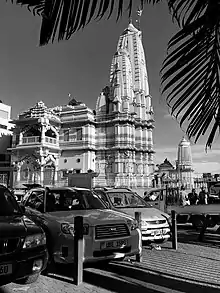Indians in Uganda
There is a sizable community of people of Indian origin living in Uganda. In 2003, there were an estimated 15,000 people of Asian descent (majority Indians and Pakistanis) living in Uganda compared to approximately 80,000 before they were expelled by dictator Idi Amin in 1972.[1]
| Regions with significant populations | |
|---|---|
| Kampala, Jinja | |
| Languages | |
| Swahili, English, Gujarati, Malayalam, Sindhi, Urdu, Kutchi, Marathi, Hindi, Odia, Punjabi, Tamil, Konkani, Telugu, Bengali | |
| Religion | |
| Hinduism, Islam, Sikhism, Christianity, Zoroastrianism, Jainism | |
| Related ethnic groups | |
| Non-resident Indian and Person of Indian Origin |
Many returned to Uganda in the 1980s and 1990s and have once again gone on to dominate the country's economy.[2] Despite making up less than 1% of the population they are estimated to contribute up to 65% of the country's tax revenues.[2] Sudhir Ruparelia, who is of Indian origin, is the richest man in Uganda and has an estimated fortune of $1 billion.[2]
History

In 1895 construction of the Uganda Railway began. The Imperial British East Africa Company awarded Alibhai Mulla Jeevanjee, an agent based in Karachi, with the contract to supply the required labour force. Jeevanjee recruited his workforce from the Punjab region of British India.[3] The first group to arrive had a total of 350 men, and over a six year period a total of 31,895 men worked on the project. Some died, others returned to India after the end of their contracts, and others chose to stay. The population was later bolstered by Gujarati traders called "passenger Indians", both Hindu and Muslim free migrants who came to serve the economic needs of the indentured laborers and to capitalize on the economic opportunities.[4][5]
Over time, Indians became prosperous and dominated much of the Ugandan economy, which prompted the rise of resentment and Indophobia.[4] These resentments came to a crisis when Idi Amin ousted Milton Obote by military coup d'état in 1971. The following year, Amin ordered the expulsion of Asians living in Uganda.[6] As a result, many Indians migrated to the United Kingdom, Canada, the United States, and elsewhere and began rebuilding their lives. After Amin's death, however, more Indians who were born in Uganda started migrating back.[7][8]
Demographically, the number of people of mixed Ugandan-Indian heritage is not known (Multiracial Ugandans in Uganda).
Notable Ugandan people of Indian descent or notable people of Indian-Ugandan descent
- Akbar Baig - Ugandan cricketer
- Alykhan Karmali - Ugandan industrialist
- Charli XCX - British singer
- Anup Singh Choudry - Former judge of the High Court of Uganda
- Arif Virani - Member of Parliament (Canada)
- Asif Din - English cricketer
- Bharat Masrani - CEO of TD Canada Trust
- Hasmukh Dawda - Businessman
- Jayesh Manek - Indian fund manager
- Jitendra Patel - Canadian cricketer
- Mahmood Mamdani - Ugandan academic
- Mayur Madhvani - Ugandan industrialist
- Miraj Barot - Businessman
- Mobina Jaffer - Canadian senator
- Mukesh Shukla - Ugandan industrialist
- Nandikishore Patel - Ugandan cricketer
- Naomi Scott - English actress and singer
- Nehal Bibodi - Ugandan cricketer
- Priti Patel - British politician
- Peter Nazareth - Ugandan-American author
- Rajat Neogy - Ugandan-American poet, Founder & First Editor of Transition Magazine
- Shailesh Vara - British politician
- Shekhar Mehta - Kenyan rally driver
- Shimit Amin - Indian film director
- Sikander Lalani - Ugandan steel magnate
- Sudhir Ruparelia - Ugandan businessman
- Suresh Dalal - Ugandan & American Attorney
- Wilfred de Souza - Politician and Chief Minister of Goa
- Walter de Sousa - Indian field hockey player.
- Bhaskar Bhattacharya- Indian independent film-maker and scholar.
References
- Lacey, Marc (17 August 2003). "Once Outcasts, Asians Again Drive Uganda's Economy". New York Times. New York City. Retrieved 14 March 2016.
- Dawood, Farhana (15 May 2016). "Ugandan Asians dominate economy after exile". www.bbc.com. BBC News. Retrieved 14 December 2017.
- Uganda Society, The Uganda journal, Kampala, 1948, p.7
- Ember, Melvin (30 November 2004). Encyclopedia of Diasporas: Immigrant and Refugee Cultures Around the World. Volume II: Diaspora Communities. Springer Science & Business Media. ISBN 9780306483219. Retrieved 26 October 2017.
- Hiralal, Kalpana (1994). "Indian Family Businesses in Natal, 1870–1950" (PDF). Natal Society Foundation. Retrieved 14 March 2016.
- Dowden, Richard (4 August 1992). "Short-sighted demagogue who played the race card: Idi Amin expelled the Asians 20 years ago. Richard Dowden, Africa Editor, explains why the decision was supported by Ugandans". The Independent. London. Retrieved 14 March 2016.
- Cohen, Ronald Lee, 1944- (1997). Global diasporas: an introduction. University of Washington Press. ISBN 0-295-97620-9. OCLC 318266657.CS1 maint: multiple names: authors list (link)
- Rajani, Rupal (6 August 2012). "Ugandan Asians: Life 40 years on". London: BBC Asian Network. Retrieved 14 March 2016.